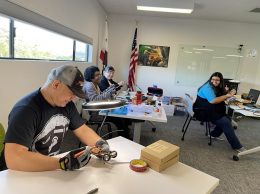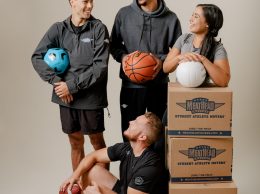Cancer foundation launches fund, enlists Amgen
IN THIS ARTICLE
- Health Care & Life Science Topic
- Marissa Wenzke Author
By Marissa Wenzke Friday, April 17th, 2015
The roots of the Kids’ Cancer Research Foundation in San Luis Obispo go back more than a decade ago to a diagnosis that changed the life and family of Frank Kalman, the organization’s founder.
“I knew nothing about cancer — absolutely nothing. And then our daughter developed a lump on her side when she was 12,” Kalman said, explaining his daughter was diagnosed with Neuroblastoma, a form of cancer that left her with a less than 50 percent chance of survival. “And that was the beginning of our new life.”
Now Kalman’s daughter, Calli, is 25 years old and has faced a painful journey of more than 10 years that included 150 weeks of chemotherapy, five relapses and three major surgeries. Throughout this time, her father sought out the best physicians, cures and cancer centers around the world on a mission to save her life.
“It was a horror. When she first got it, her chances of survival were 45 percent,” Kalman said. “That’s when my wife and I said we’re going to pull out all the stops and find someone out there who can help her.”
After years of exploring various treatments and facilities across the country, Kalman started the Kids’ Cancer Research Foundation in 2012.
Enlisting the help of author and activist Christopher Kennedy Lawford, nephew of the late Sen. Ted Kennedy who helped pass the National Cancer Act in 1971, Kalman began searching for the best doctors and researchers in pediatric cancer research to launch the Kids’ Cancer Research Foundation.
“With him on board, we recruited some of the top guys in the field,” he said.
This year the foundation is establishing a new program call the Neuroblastoma Research Fund, with a goal of raising $400,000 by the end of this year. Neuroblastoma, a cancer of the nerve cells outside the brain, is the most common form of cancer in infants and survival rates for children diagnosed with it are just 65 percent. If a child experiences relapse following treatments, the survival rate goes down to just 5 percent or less.
“All the kids we’ve met at the beginning of this journey are gone,” Kalman said, adding that Neuroblastoma results in more lost years of life than most other cancers. The SEER Cancer Statistics Review reports the average number of years lost to cancer is 15 years, while that number is 69.3 years for Neuroblastoma.
“In many cases, the care for people is out there and they’re just not able to make the connection,” Kalman said. He said pursuing the right treatments and doctors for his daughter has taken a span of at least 10 years, noting that smaller, local hospitals and doctors are oftentimes not able to zero in on a particular disease and successfully treat it to the extent of a major center specializing research for that particular medical condition.
To help cancer patients and their families navigate the different facilities and resources for treatment, Kalman put together 40-page guide called “Steps to Hope: A Practical Guide to Seeking the Best Possible Cancer Care.”
The foundation has been featured in a March 2014 issue of Reader’s Digest for the book’s influence on current cancer research and the book has been praised by physicians such as Dr. Siddhartha Mukherjee, who won a Pulitzer Prize for his book, “The Emperor of All Maladies: A Biography of Cancer.” He called the book “a helpful and much needed guide for children with cancer.”
Biotech firm Amgen and CAC2, or the Coalition Against Childhood Cancer, have both partnered with the Kids’ Cancer Research Foundation, with CAC2 helping on advocacy efforts at the government level and Amgen, based in Thousand Oaks, assisting in numerous research trials. With these organizations, the Kids’ Cancer Research Foundation targets the most promising areas of cancer research, such as T-cell therapy, which Kalman said has provided patients with a 30 percent reduction in the chance of relapse.
Currently, public funding for pediatric cancer research in the United States makes up just around 4 percent of all cancer research funding in the country, Kalman said, making foundations like KCRF especially needed. “The beauty of supporting pediatrics is that these guys are used to getting things done for peanuts because they’ve had to before,” he said. “All the suffering we’ve witnessed is our foundation’s motivation.”











